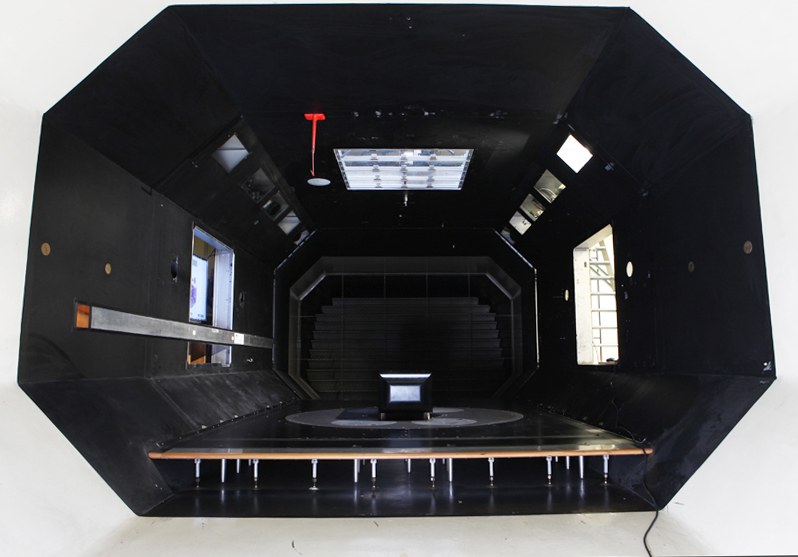The Institute

The Institute of Fluid Dynamics (IFD) comprises the professorships held by F. Coletti, P. Jenny and O. Supponen. external page Prof. G. Haller from the Institute for Mechanical Systems and Prof. N. Noiray from the Institute of Energy and Process Engineering are affiliated with IFD. While the research activities of the three IFD professorships are largely complementary, there is close cooperation and resource sharing in teaching, infrastructure and administrative matters. Students are encouraged to move freely between the professorships in the Institute and their respective offerings in teaching and research. This assures a broad yet fundamental education in different fields of fluid dynamics using theoretical, numerical and experimental methods.
Institute Goals
Fluid dynamics is both a core discipline of modern engineering and a highly active area of ongoing research and development. The field is linked to fundamental questions in mathematics, physics, chemistry and biology, and at the same time forms an integral part of many technical designs, products and environmental processes. Its established importance in fields such as aerodynamics (e.g. cars, trains, ships, aircraft), energy technology (turbomachinery, combustion engines, wind turbines) or environmental modeling (oceanography, meteorology, limnology) is increasingly being augmented by interdisciplinary applications, for example in medicine, biology or micro- and nanoscale engineering.
A profound and structured education in fluid dynamics remains essential for future scientists and engineers. IFD aims at providing such an education, emphasizing fundamental concepts and their application using theoretical, numerical and experimental tools and methodologies.
By conducting active research in a number of specialized areas of fluid dynamics, IFD faculty and researchers aim to contribute to the solution of challenging problems both at the fundamental and applied level. Priority is given to areas and topics where results will have an impact beyond the original setting, maintaining a broadly recognizable and sustained expertise at the Institute.
The joint research objective of the institute is the scientific exploration and the engineering application of fluid dynamic processes. Within this scope, research at IFD is primarily aimed at the development and application of modern computational and experimental tools to probe a broad spectrum of problems in fluid dynamics.
On one hand, we develop numerical methods for the simulation of turbulent flows, biomedical flows, rarefied gases, and flows in natural porous media. Currently our numerical methods for turbulent flows aim at improving predictions by incorporating existing measurement data. In the porous media context, we are interested in transfering pore-/local-scale physics to the field scale by means of suitable numerical schemes or upscaling techniques. On the other hand, we apply our own as well as existing simulation techniques to gain a better understanding of turbulent dispersed-phase flows, such as sprays, and blood flows in the brain and the human heart.
A first experimental effort at IFD is focused on the development of techniques that enable the optical/acoustic observation and characterization of high-speed multiphase fluid phenomena. These techniques are needed for the investigation and potential control of bubble dynamics that are for example at work in flows involving cavitation.
A second set of experimental efforts are centered around the collective motion of particles. These entities appear in fluid flows in different incarnations such as red blood cells, snowflakes, sand grains, etc. Equally diverse is accordingly the set of measurement tools ranging from high-speed/-resolution laser imaging to medical imaging techniques, which are applied to study the resulting multiphase flows.
The broad in-house competence facilitates also the implementation of joint experimental and numerical studies. This approach has proven to be particularly successful in different biomedical applications. Here, the existing medical knowledge of doctors is combined with rigorous analytical models describing the underlying fluid dynamics. Computer simulations and experiments using custom-designed engineering models are then employed to further explain the observed phenomena and to develop possible diagnostic and treatment scenarios. Examples for this multi-tiered approach are the study of blood perfusion in the human brain or the development of a new concept for a heart-assist device.
Modern large-scale facilities (computer cluster, wind and water tunnel facilities, advanced imaging systems, etc.) are available at or accessible from IFD to conduct the different research projects in a state-of-the-art and technologically competitive environment.
Funding for the activities comes from different sources such as national research grants (ETH internal and Swiss national funding agencies), European research programs, and collaborations with Swiss and foreign industries.
With its chosen portfolio of activities, IFD is recognized as a competence center for fluid dynamics research within ETH and in the wider national and international context. Collaborations with other institutes, organizations and companies are actively sought and maintained, both on the level of undergraduate student work and in the form of multi-year graduate research projects.
The Institute provides the basic education in fluid dynamics to all students of Mechanical Engineering primarily through an extensive mandatory course at the Bachelor level. Another teaching contribution at the undergraduate level is the participation in the focus specialization "Sustainable Energy and Processes". Here, classes such as "Experimental Methods for Engineers", "Turbulent Flows", "Computational Methods for Flow, Heat and Mass Transfer Problems", "Multiphase Flows" and "Hydrodynamics and Cavitation" are offered by IFD faculty.
At the graduate level, IFD offers courses for a specialization in the areas of "Fluid Science and Engineering", "Aerospace Engineering", and "Biological Fluid Science". Several classes are offered at this level by IFD personnel and associated external lecturers. In addition, IFD provides the mandatory fluid dynamics education and an eligible specialization within the interdisciplinary Bachelor/Master program "Computational Science & Engineering" offered by a collaboration of several ETH Departments.
Contact
ETH Zürich
Institut für Fluiddynamik
Sonneggstrasse 3
8092
Zürich
Schweiz